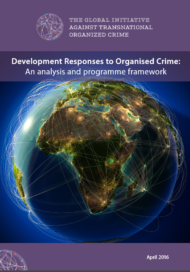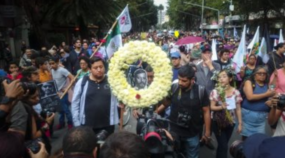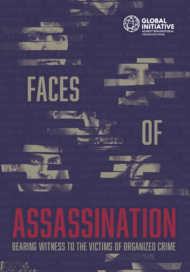Posted on 11 Jul 2014
Said Mwema, former Tanzanian police chief, spoke to the GI about his experiences at the helm of the police force in Tanzania and his thoughts on combatting organized crime in his country, the East Africa region and beyond.
As a young boy growing up in Moshi, Tanzania, Saidi Ally Mwema was inspired by the smart police recruits from the nearby police training college, patrolling the streets in the course of their training. He decided to join up, little knowing that he would one day be the country’s top cop, in charge of all of them. Mwema worked his way up the police force and garnered experience in a range of policing divisions, including fraud investigation and foreign exchange violations. He also completed a law degree at the University of Dar es Salaam in 1988. In 2006 he became the country’s Inspector General of Police, a position he held until he retired last year.
Mwema, who now runs his own law firm, has largely been credited with overhauling the Tanzanian police force during his time in office, introducing new standards, and translating community policing into a workable, grassroots strategy that helped bring down crime in the country.
Reforming the police force into a professional entity able to “work closely with communities to prevent and solve crime”, was one of his biggest achievements, he says. Another notable achievement was the decline in bank robberies, car thefts, street robbery and other crimes that the country began to experience roughly two years after his appointment as Inspector General of Police in 2006. He received accolades from the business industry, which credited him with forging the public/private partnerships that proved critical in bringing down crime rates.
Now retired from the force, Mwema’s ongoing involvement with the law allows him to continue pursuing freedom and justice, as well as work for the “protection of life and property”. Mwema, who is married with four children and five grandchildren, loves to read – particularly stories about real life and the law – and unwind in the game reserve, where searching for the Big Five is an infinitely more relaxing pastime than pursuing criminals.
1. Can you recall an exciting “crime-busting” career highlight?
There was a syndicate conducting bank robbers in 2009. When someone was arrested on a simple case of fighting with his wife we managed to find out that he had been involved in an armed robbery. We finally got him to talk and his disclosures implicated a whole lot of others. We didn’t get all of them at once but eventually, after much investigation, we were able to arrest 15 people who were caught with arms and ammunition. They were part of a regional criminal network operating in Tanzania, Kenya and Mozambique. Since then, the number of bank robberies dropped significantly.
2. How does organized crime impact on Tanzania and the region generally?
Tanzania is a country of origin for the cultivation of cannabis sativa, which is then sent on to Europe and the United States. It is also a country of transit and destination. There is much movement of guns through the country, though they are not made here. We deal a lot with the fall-out from the conflict in the Horn of Africa, both in the form of weapons trafficking and refugees.
3. To what extent are law and order institutions in Africa equipped to deal with transnational organized crime? What can be done to strengthen their efforts?
Organized crime presents a sophisticated and multi-faceted threat that needs an integrated agency approach. We need to work closely with willing and reliable international, regional and local partners to strengthen institutions and break down the corruptive power of TOC networks. We need to strengthen governance and transparency so as to enhance the rule of law. This can be achieved firstly by looking inward, by eliminating these networks within our own borders as a starting point. We also need to go after the enterprises that are enabling crime. For example, if we know there is a company supporting the illicit trafficking of drugs by providing transport, we have to seize the vehicles, go for asset forfeiture and the civil courts. In other words we have to do whatever we can to break the trafficking chain. Community policing is also very effective. We have very porous borders but the people engaged in organized crime who are crossing borders have to hide somewhere and if communities are on board with our policing efforts, they can assist us in flushing them out.
4. Fragile states – and governments – are said to be more vulnerable to transnational organized crime. How can they be buffered to resist it?
We need to strengthen the rule of law, governance and transparency. This has to be done in an integrated way. Law and order on its own cannot combat TOC. I also see a lot of corruption. We must acknowledge that whether we are in Africa, North and South America, Europe or Asia, no-one is immune from public corruption. This allows transnational organized crime to operate in a variety of ways, by exploiting transportation, commercial enterprise and communication structures, for example. We are also challenged by our lack of technology. Today, criminals can take advantage of technology to act with speed. We need to harness the same technology to work better. The Global Initiative needs to look into this – exploring new innovations and approaches in combating crime. Economic and social development is also very important in giving people alternatives to crime but that said, if people commit crimes because they don’t have employment they cannot be excused. They need to know that there are other forms of livelihood that they can engage in.
5. To what extent are countries on the African continent co-operating in the fight against transnational organized crime and how can their efforts be improved?
There are certainly reform efforts underway in Tanzania and the continent in general. There is a need for a better legal framework to support our efforts to conduct effective operations. Co-operation between developed and developing countries is an important factor in achieving success. We all need to expand and deepen our understanding of TOC through co-operation and information sharing. We also need to strengthen our laws against crimes committed in cyberspace. We need to engage in joint training and joint operations. Most of all we need to ensure that the UN Convention against TOC is ratified. Interpol’s hub for combatting TOC facilitates regional seminars, workshops and training. Many countries in the east African region have come together to share ideas and information. We have also conducted successful joint operations – for example, Operation uMoja (a combined operation between Tanzania, Kenya and Uganda to crack down on car thefts in 2006) and Operation Mamba. (The latter saw the co-operation between Interpol and the World Health Organization in 2008/9 to combat trafficking in counterfeit medicines.) But in terms of regional co-operation there is certainly room for improvement. Without it, I don’t see how we can successfully fight criminal networks.
6. What, in your view, is the purpose of the Global Initiative against Transnational Organized Crime and how can its impact be strengthened?
The GI can play a vital role in sharing knowledge and contacts. It can provide advice and assistance, particularly regarding developing countries, and can help influence policy. The GI brings together people with a vast amount of international experience and a unique mix of skills. We can achieve maximum impact using the multi-faceted approach that the GI facilitates – drawing together people from both civil society and law and order to combat organized crime, for example.
[wpfilebase tag=file id=807 /]



